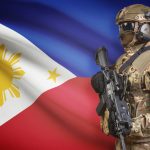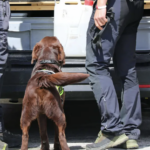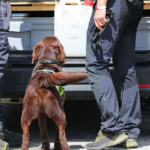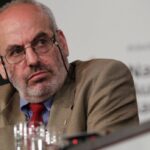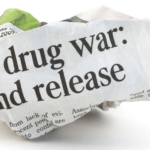Former Philippines President Faces Trial Over Drug War Killing Spree
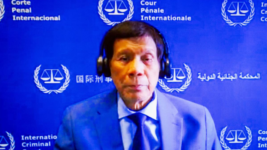
The fact that former Philippines president Rodrigo Duterte, who on taking office in June 2016, launched a drug war comprised of mass extrajudicial killings that continued until he left office in June 2022, is now in the custody of the International Criminal Court (ICC) awaiting trial, shows that the days when an association with illicit drugs being reason to dehumanise and destroy people is over.
The ICC pre-trial chamber (PTC) issued an arrest warrant against Duterte’s name on 11 March 2025, and he was handed over to the ICC after the Marcos government of the Philippines arrested him in accordance with the document.
The warrant charges Duterte with one count of the crime against humanity of murder, contrary to article 7 of the Rome Statute of the International Criminal Court.
Duterte announced the drug war on being elected in May 2016. The charge against his name covers his indirect co-perpetration of murders from 1 November 2011 until 16 March 2019. So, the criminal behaviour linked to Duterte is alleged to have commenced when he was the vice mayor and then the mayor of Mindanao’s Davao City. And Duterte is the founder of the Davao Death Squad (DDS).
The death toll relating to Duterte’s war on drugs policy is officially said to be 6,252 Filipinos slain over the period June 2016 through to June 2022, which included people gunned down over personal drug possession. However, human rights organisations estimate the real death toll sits at somewhere between 12,000 and 30,000 people killed.
Duterte was not shy about his tough on drugs policy that greenlit the mass killing and imprisoning of poor people over links to illicit substances, and he even invited civilians to join in the killing spree, revealing that so severe was the stigma and resulting discrimination around illicit drugs that the then Filipino head of state considered the entire planet would raise no major issue over the slaughter.
The mass murder of people who use drugs
Duterte took a hardline stance on drugs in the lead up to his 2016 election, and during his inauguration speech he actually told Filipino citizens that if they knew “any addicts, go ahead and kill them yourself, as getting their parents to do it would be too painful”.
To be so bold as to make these suggestions on the basis that someone might be a drug user reveals the hardened societal attitudes towards people who use drugs. Victims were often being left gunned down on the side of the road, with a sign next to them identifying what sort of association they had with the illegal drug trade, such as “dealer,” “pusher” or “user”.
By July 2016, images of locals laying slain on roadsides began flooding the internet, as people who appeared on kill lists, were suddenly executed. Duterte produced one kill list that contained 150 officials said to have drug associations. Much of the killings were carried out by police acting under the official policy, while a great number were perpetrated by vigilantes with the authorities’ blessing.
The ICC prosecutor announced it was launching the PTC in respect of Duterte in April 2021. The case was based on input from victims and witnesses of Duterte’s drug war. This led to the establishment of the ICC investigation into the Situation in the Philippines in September that same year.
The case against Duterte posits that the DDS and Philippines law enforcement carried out the “widespread and systematic” killing of thousands of alleged illicit drug offenders, whilst Duterte was the head of the DDS, and the drug war stood as official government policy.
The ICC Office of the Prosecutor originally sought an arrest warrant with two further counts of the crimes against humanity of rape and torture, however while the evidence that these crimes were perpetrated was available, their connection to Duterte was not able to be made out.
The murders linked to Duterte include at least 19 alleged drug dealers or thieves at the hands of the DDS and another 24 murders of alleged dealers, thieves or drug users by local law enforcement. The DDS death squad was formed in the late 1990s, when Duterte was a member of the Philippines House of Representatives and the warrant captures murders when he was Davao mayor.
Following the ICC Office of the Prosecutor announcing in February 2018 that it intended to launch an inquiry into the Philippines’ drug war, Duterte announced the following month that he’d be withdrawing his nation from the International Criminal Court and the Philippines was officially withdrawn from the planet’s highest criminal authority in March 2019.
The failed war on drugs
International condemnation of the mass killings on the pretext of involvement in illicit drugs was thin on the ground, as other nations failed to intervene, while the United Nations Office on Drugs and Crime released an August 2016 statement of condemnation. But UNODC only did this after 300 civil society groups from around the globe released a statement requesting it take that action.
This was neither the first time a government had brutally cracked down on people involved with illegal drugs. Although the ICC intervention in this regard is a first.
In February 2003, then Thai prime minister Thaksin Shinawatra launched his own war on drugs, which aimed to make Thailand drug free, and it involved the extrajudicial killing of more than 2,800 people within the first three months of the operation.
International drug control treaties began being progressed in the early years of the 20th century. This culminated in the 1925 Geneva Convention, which placed restrictions on the recreational use of opium, coca and cannabis. And the 1961 United Nations Single Convention on Narcotic Drugs hailed in the current era of international drug control under the United Nations system.
But it was the 1971 launch of the war on drugs by the US Nixon administration, which entailed enhanced law enforcement operations both domestically and abroad and was further progressed across the planet. And it is this initiative that really laid down the foundational attitudes that encouraged nations like the Philippines and Thailand to take such an aggressive approach to drugs.
Garnering preferrable witnesses
This week, as Duterte killed time in an ICC holding cell at The Hague, the pre-trail chamber has been deliberating upon a request made by counsel for the defence Nicholas Kaufman, which seeks to limit the list of victims and witnesses set to testify at trial to people from the Philippines who have been issued with national ID cards or passports. However, prosecutors are arguing against this move.
ICC lawyer Joel Butuyan explained on 9 April that the types of ID that Kaufman wants to demand witnesses produce are “badges of wealth and privilege in the Philippines”. So, this would rule out the people who were the victims of the Filippino drug war, as they, for the most part, were the country’s poor, and these people are not likely to possess the documentation being demanded.
“The victims’ families have already lost loved ones. For them to be refused recognition as victims of the murderous Mr Duterte, because of their lack of government-issued IDs, is to make them suffer grave injustice twice over,” Butuyan told the PTC on Wednesday.
“Mr Kaufman, the victims must have the say on who should speak for them, and not you who speaks for the mass murderer,” the ICC lawyer told British Israeli defence attorney Kaufman.


